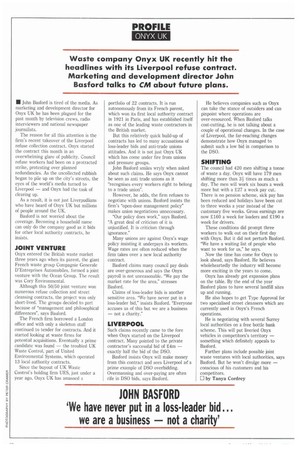• John Basford is tired of the media. As marketing
Page 34

If you've noticed an error in this article please click here to report it so we can fix it.
and development director for Onyx UK he has been plagued for the past month by television crews, radio interviewers and national newspaper journalists.
The reason for all this attention is the firm's recent takeover of the Liverpool refuse collection contract. Onyx started the contract this month in an overwhelming glare of publicity. Council refuse workers had been on a protracted strike, protesting over planned redundancies. As the uncollected rubbish began to pile up on the city's streets, the eyes of the world's media turned to Liverpool — and Onyx had the task of clearing up.
As a result, it is not just Liverpudlians who have heard of Onyx UK but millions of people around the UK, Basford is not worried about the coverage. Becoming a household name can only do the company good as it bids for other local authority contracts, he insists.
JOINT VENTURE
Onyx entered the British waste market three years ago when its parent, the giant French waste group Compagnie Generale D'Entreprises Automobiles, formed a joint venture with the Ocean Group. The result was Cory Environmental.
Although this 50/50 joint venture won numerous refuse collection and street cleansing contracts, the project was only short-lived. The groups decided to part because of "management and philosophical differences", says Basford.
The French firm borrowed a London office and with only a skeleton staff continued to tender for contracts. And it started looking at waste firms for potential acquisitions. Eventually a prime candidate was found — the troubled UK Waste Control, part of United Environmental Systems, which operated 13 local authority contracts.
Since the buyout of UK Waste Control's holding firm UES, just under a year ago, Onyx UK has amassed a portfolio of 22 contracts. It is run autonomously from its French parent, which won its first local authority contract in 1921 in Paris, and has established itself as one of the leading waste contractors in the British market.
But this relatively quick build-up of Contracts has led to many accusations of loss-leader bids and anti-trade unions attitudes. And it is not just Onyx UK which has come under fire from unions and pressure groups.
John Basford smiles wryly when asked about such claims. He says Onyx cannot be seen as anti trade unions as it "recognises every workers right to belong to a trade union".
However, he adds, the firm refuses to negotiate with unions. Basford insists the firm's "open-door management policy" makes union negotiations unnecessary.
"Our policy does work," says Basford. "A great deal of criticism of it is unjustified. It is criticism through ignorance."
Many unions are against Onyx's wage policy insisting it underpays its workers. Wage rates are often reduced when the firm takes over a new local authority Contract.
Basford claims many council pay deals are over-generous and says the Onyx payroll is not unreasonable. "We pay the market rate for the area," stresses Basford.
Claims of loss-leader bids is another sensitive area. "We have never put in a loss-leader bid," insists Basford. "Everyone accuses us of this but we are a business — not a charity."
LIVERPOOL
Such claims recently came to the fore when Onyx started on the Liverpool contract. Many pointed to the private contractor's successful bid of .E.4m — exactly half the bid of the DSO.
Basford insists Onyx will make money from this contract and sees Liverpool asa prime example of DSO overbidding. Overmanning and over-paying are often rife in DSO bids, says Bastard.
He believes companies such as Onyx can take the stance of outsiders and can pinpoint where operations are over-resourced. When Basford talks cost-cutting, he is not talking about a couple of operational changes. In the case of Liverpool, the far-reaching changes demonstrate how Onyx managed to submit such a low bid in comparison to the DSO.
SHIFTING
The council had 420 men shifting a tonne of waste a day. Onyx will have 179 men shifting more than 3i times as much a day. The men will work six hours a week more but with a £27 a week pay cut. There is no pension scheme, sick pay has been reduced and holidays have been cut to three weeks a year instead of the customary five weeks. Gross earnings are now £160 a week for loaders and £190 a week for drivers.
These conditions did prompt three workers to walk out on their first day with Onyx. But it did not perturb Basford. "We have a waiting list of people who want to work for us," he says.
Now the time has come for Onyx to look ahead, says Basford. He believes wholeheartedly the industry will become more exciting in the years to come.
Onyx has already got expansion plans on the table. By the end of the year Basford plans to have several landfill sites up and running.
He also hopes to get Type Approval for two specialised street cleansers which are currently used in Onyx's French operations.
He is negotiating with several Surrey local authorities on a free bottle bank scheme. This will put liveried Onyx vehicles in competitors's territory — something which definitely appeals to Basford.
Further plans include possible joint waste ventures with local authorities, says Basford. But he won't divulge more — conscious of his customers and his competitors.
D by Tanya Cordrey












































































